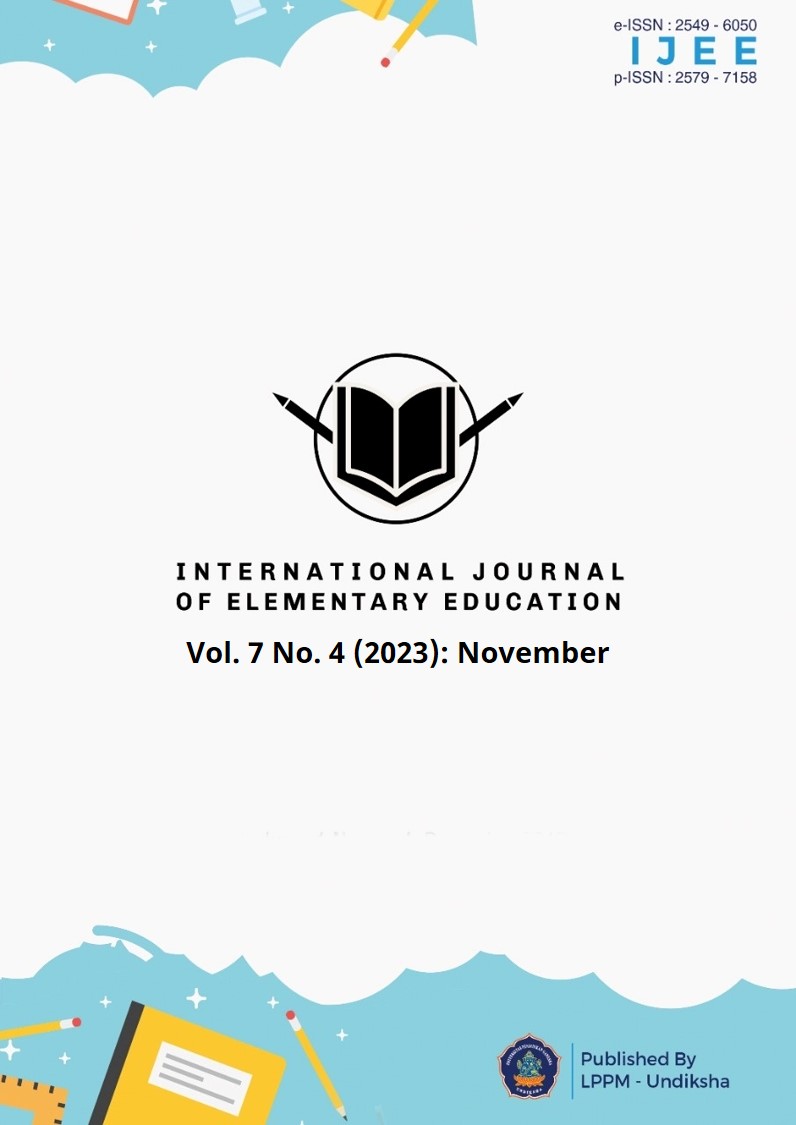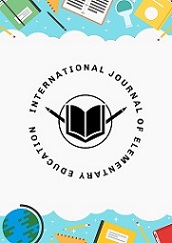SETS (Science, Environment, Technology, and Society) Based Disaster Learning on Elementary School Students' Disaster Literacy and Resilience
DOI:
https://doi.org/10.23887/ijee.v7i4.67651Keywords:
Disaster Models, SETS, Disaster Literacy, Disaster ResilienceAbstract
This research is motivated by students' literacy and resilience to disasters, which are still relatively low. This study aims to analyze the impact of the SETS-based disaster learning model on disaster literacy and resilience of grade V elementary school students. The method used in this research is a quasi-experiment with a non-equivalent control group design. Literacy and resilience were collected by giving fifth-grade elementary school students questionnaires. The subjects involved consisted of 2 experimental classes totaling 74 students and 2 control classes totaling 88 students. The data collection technique used the questionnaire method, with the instrument tested for validation and instrument reliability. The data collection is the questionnaire method, with instruments tested for validation and reliability. Data analysis techniques used descriptive analysis tests, normality tests, homogeneity tests, and hypothesis testing, namely, the multivariate analysis of variance (Manova). The results showed that there was a significant difference in disaster literacy and resilience between students who studied using the SETS-based disaster learning model and students who studied with conventional learning models, so it can be concluded that the SETS-based disaster learning model has a positive impact on disaster literacy and resilience of grade fifth elementary school students.
References
Afrian, R., & Islami, Z. R. (2019). Peningkatan potensi mitigasi bencana dengan penguatan kemampuan literasi kebencanaan pada masyarakat Kota Langsa. Jurnal Pendidikan Geografi, 24(2), 132–144. https://doi.org/10.17977/um017v24i22019p132. DOI: https://doi.org/10.17977/um017v24i22019p132
Amaliya, S., Rusilowati, A., & Supriyadi. (2011). Penerapan Physics Communication Games Dengan Pendekatan Sets Untuk Meningkatkan Pemahaman Kebencanaan Dan Minat Belajar Sains Fisika Siswa SMP. Jurnal Pendidikan Fisika Indonesia, 7(2), 101–105.
Atmojo, M. E. (2020). Pendidikan Dini Mitigasi Bencana. Jurnal Abdimas BSI: Jurnal Pengabdian Kepada Masyarakat, 3(2), 118–126. https://doi.org/10.31294/jabdimas.v3i2.6475. DOI: https://doi.org/10.31294/jabdimas.v3i2.6475
Börner, S. (2023). Emotions matter: EMPOWER-ing youth by integrating emotions of (chronic) disaster risk into strategies for disaster preparedness. International Journal of Disaster Risk Reduction, 89. https://doi.org/10.1016/j.ijdrr.2023.103636. DOI: https://doi.org/10.1016/j.ijdrr.2023.103636
Budiarti, R., Wilujeng, I., Jumadi, J., & Senam, S. (2016). Pengaruh Pembelajaran IPA Berbasis Sets Terhadap Pengetahuan Lintas Disiplin Peserta Didik. Jurnal Cakrawala Pendidikan, 3(3). https://doi.org/10.21831/Cp.V35i3.10419. DOI: https://doi.org/10.21831/cp.v35i3.10419
Fatmawati, A. (2016). Pengembangan Perangkat Pembelajaran Konsep Pencemaran Lingkungan Menggunakan Model Pembelajaran Berdasarkan Masalah untuk SMA Kelas X. EduSains, 4(2), 94–103. DOI: https://doi.org/10.22219/jinop.v2i1.3281
Fitransyah, M. D., & Supardi, Z. A. I. (2022). Penerapan Pembelajaran SETS (Science, Environment, Technology and Society) untuk meningkatkan Pemahaman Kebencanaan Tsunami Peserta didik pada materi Gelombang Mekanik. IPF: Inovasi Pendidikan Fisika, 11(2), 11–16. https://doi.org/10.26740/ipf.v11n2.p11-16. DOI: https://doi.org/10.26740/ipf.v11n2.p11-16
Fitri, W. (2014). Nilai Budaya Lokal, Resiliensi, dan Kesiapan Menghadapi Bencana Alam. Personifikasi, 5(2), 123–138.
Hadi, H., Agustina, S., & Subhani, A. (2019). Penguatan Kesiapsiagaan Stakeholder dalam Pengurangan Risiko Bencana Alam Gempabumi. Geodika: Jurnal Kajian Ilmu dan Pendidikan Geografi, 3(1), 30–40. https://doi.org/10.29408/geodika.v3i1.1476. DOI: https://doi.org/10.29408/geodika.v3i1.1476
Hafida, S. H. N. (2018). Urgensi Pendidikan Kebencanaan Bagi Siswa Sebagai Upaya Mewujudkan Generasi Tangguh Bencana. Jurnal Pendidikan Ilmu Sosial, 28(2), 1–10.
Hayati, I. A., Rosana, D., & Sukardiyono, S. (2019). Pengembangan modul potensi lokal berbasis SETS untuk meningkatkan keterampilan proses IPA. Jurnal Inovasi Pendidikan IPA, 5(2), 248–257. https://doi.org/10.21831/jipi.v5i2.27519. DOI: https://doi.org/10.21831/jipi.v5i2.27519
Imaduddin, M., & Hidayah, F. F. (2019). Redesigning laboratories for pre-service chemistry teachers: From cookbook experiments to inquiry-based science, environment, technology, and society approach. Journal of Turkish Science Education, 16(4), 489–507. https://doi.org/10.36681/tused.2020.3. DOI: https://doi.org/10.36681/tused.2020.3
Indrawati, F. Y., Fatmaryanti, S. D., & Maftukhin, A. (2019). Pengaruh Pembelajaran Fisika Menggunakan Model SETS (Science, Environment, Technology, and Society) Terintegrasi Mitigasi Bencana Alam Terhadap Kemampuan Analisis dan Transferable Skills Peserta Didik. Radiasi : Jurnal Berkala Pendidikan Fisika, 12(2), 54–60. https://doi.org/10.37729/radiasi.v12i2.52. DOI: https://doi.org/10.37729/radiasi.v12i2.52
Irawan, I., Subiakto, Y., & Kustiawan, B. (2022). Manajemen Mitigasi Bencana Pada Pendidikan Anak Usia Dini untuk Mengurangi Risiko Bencana Gempa Bumi. PENDIPA Journal of Science Education, 6(2), 609–615. https://doi.org/10.33369/pendipa.6.2.609-615. DOI: https://doi.org/10.33369/pendipa.6.2.609-615
Khusna, N. I., Sumarmi, Bachri, S., Astina, I. K., Susilo, S., & Idris. (2023). Social resilience and disaster resilience: A strategy in disaster management efforts based on big data analysis in Indonesian’s twitter users. Heliyon, 9. https://doi.org/10.1016/j.heliyon.2023.e19669. DOI: https://doi.org/10.2139/ssrn.4490216
Kimura, R., Hayashi, H., Kobayashi, K., Nishino, T., Urabe, K., & Inoue, S. (2017). Development of a “disaster management literacy hub” for collecting, creating, and transmitting disaster management content to increase disaster management literacy. Journal of Disaster Research, 12(1), 42–56. https://doi.org/10.20965/jdr.2017.p0042. DOI: https://doi.org/10.20965/jdr.2017.p0042
Koem, S., & Akase, N. (2022). Konseptualisasi Untuk Komunitas: Menuju Kesukarelaan Dalam Aksi Adaptasi Dan Mitigasi Bencana. LAMAHU: Jurnal Pengabdian Masyarakat Terintegrasi, 1(1), 16–23. https://doi.org/10.34312/lamahu.v1i1.13560. DOI: https://doi.org/10.34312/lamahu.v1i1.13560
Labudasari, E., & Rochmah, E. (2020). Literasi bencana di sekolah: Sebagai edukasi untuk meningkatkan pemahaman kebencanaan. Metode Didaktik: Jurnal Pendidikan Ke-SD-an, 16(1), 41–48. https://doi.org/https://doi.org/10.17509/md.v16i1.22757.
Lestari, A. D., Sutarno, S., Rohadi, N., Sakti, I., & Nirwana, N. (2021). Pengembangan Modul Fisika Berbasis Science, Environment, Technology, and Society (Sets) Untuk Melatihkan Keterampilan Berpikir Kreatif Siswa Sma Pada Materi Usaha Dan Energi. Jurnal Kumparan Fisika, 4(2), 147–154.
Lestari, W. D., Yuhanna, W. L., & Lukitasari, M. (2020). Pengembangan Media Bio Pop-Up Book Terintegrasi Science, Environment, Technology, And Society (SETS) Pada Pembelajaran Biologi Materi Daur Biogeokimia. Jurnal Edukasi Matematika dan Sains, 8(2), 130–139. https://doi.org/10.25273/jems.v8i2.7442. DOI: https://doi.org/10.25273/jems.v8i2.7442
Maliki, R. Z., Arsy, R. F., Rahmawati, R., & Muis, A. A. (2023). Pendampingan Pemetaan Partisipatif Sekolah Siaga Bencana. Surya Abdimas, 7(1), 1–7. https://doi.org/10.37729/abdimas.v7i1.2322. DOI: https://doi.org/10.37729/abdimas.v7i1.2322
Marlyono, S. G., Pasya, G. K., & Nandi. (2016). Peranan Literasi Informasi Bencana Terhadap Kesiapsiagaan Bencana Masyarakat Jawa Barat. Gea. Jurnal Pendidikan Geografi, 16(2), 116–123. https://doi.org/https://doi.org/10.17509/gea.v16i2.4491. DOI: https://doi.org/10.17509/gea.v16i2.4491
Maryani, E., Ruhimat, M., & Logayah, D. S. (2022). Bencana Pada Guru Mgmp. GERVASI: Jurnal Pengabdian kepada Masyarakat, 6(3), 948–959. DOI: https://doi.org/10.31571/gervasi.v6i3.4863
Mursalin, E., & Setiaji, A. B. (2021). Menumbuhkan Kepedulian Lingkungan melalui Literasi Sains : Penggunaan Pendekatan dan Model Pembelajaran yang Efektif. Proceeding Seminar Pendidikan Nasional Jurusan Tarbiyah FTIK IAIN Palangka Raya, 95–104.
Nazaruddin, M. (2015). Jurnalisme Bencana di Indonesia, Setelah Sepululi Tahun. Jurnal Komunikasi, 10(1), 79–88. https://doi.org/https://doi.org/10.20885/komunikasi.vol10.iss1.art8. DOI: https://doi.org/10.20885/komunikasi.vol10.iss1.art8
Nieveen, N. (1999). Prototyping to Reach Product Quality. Jan Van den Akker, Robert Maribe Braneh, Kent Gustafson, and Tjeerd Plomp (Ed). London: Kluwer Academic Publisher.
Novak, J., Lozos, J. C., & Spear, S. E. (2019). Development of an Interactive Escape Room Intervention to Educate College Students about Earthquake Preparedness. Natural Hazards Review, 20(1), 1–5. https://doi.org/10.1061/(asce)nh.1527-6996.0000322. DOI: https://doi.org/10.1061/(ASCE)NH.1527-6996.0000322
Nuriman, N., Agustiningsih, A., Mahmudi, K., Aguk, A., Wardani, R. P., & Alfian, Z. (2022). Edukasi Pendidikan Mitigasi Erupsi Gunung Semeru pada Siswa Sekolah Dasar. Jurnal Basicedu, 6(6), 9958–9966. https://doi.org/10.31004/basicedu.v6i6.4180. DOI: https://doi.org/10.31004/basicedu.v6i6.4180
Permana, I. Y. (2021). Pendidikan Keaksaraan Dasar Literasi Mitigasi Bencana. Jurnal AKRAB, 12(1), 18–27. https://doi.org/10.51495/jurnalakrab.v12i1.372. DOI: https://doi.org/10.51495/jurnalakrab.v12i1.372
Prakoso, B., Widana, I. D. K. K., & Subiyanto, A. (2021). Pendidikan dan Literasi Bencana dalam Kerangka Tri Sentra Pendidikan untuk Generasi Tangguh Bencana. Jurnal Manajemen Bencana, 7(1), 59–76. https://doi.org/10.33172/jmb.v7i1.705.
Prastyo, E., Kartika, I., & Wibowo, W. S. (2021). Kualitas subject specific pedagogy (SSP) IPA berbasis model iqra’ dan literasi mitigasi bencana merapi. Edu Sains: Jurnal Pendidikan Sains & Matematika, 9(2), 130–137. https://doi.org/10.23971/eds.v9i2.2244. DOI: https://doi.org/10.23971/eds.v9i2.2244
Puspitasari, D. C., Aini, M. N., & Satriani, R. (2019). Penguatan Resiliensi dan Strategi Penghidupan Masyarakat Rawan Bencana. Talenta Conference Series: Local Wisdom, Social, and Arts (LWSA), 2, 32–40. https://doi.org/10.32734/lwsa.v2i1.592. DOI: https://doi.org/10.32734/lwsa.v2i1.592
Ragil, Z., & Sukiswo, S. E. (2011). Penerapan Pembelajaran Sains dengan Pendekatan Sets pada Materi Cahaya untuk Meningkatkan Hasil Belajar Siswa Kelas V SD. Jurnal Pendidikan Fisika Indonesia, 7(1), 69–73. https://doi.org/10.15294/jpfi.v7i1.1073.
Rahmat, H. K., Sari, F. P., Hasanah, M., Pratiwi, S., Ikhsan, A. M., Rahmanisa, R., Pernanda, S., & Fadil, A. M. (2020). Upaya Pengurangan Risiko Bencana Melalui Pelibatan Penyandang Disabilitas Di Indonesia: Sebuah Tinjauan Kepustakaan Disaster Risk Reduction Efforts Through Involvement of People With Disabilities in Indonesia: a Literature Review. Jurnal Manajemen Bencana (JMB), 6(2), 55–64. https://doi.org/10.33172/jmb.v6i2.623.
Rahmat, Nizzamudin, & Agussabati. (2015). Kajian Distribusi Pengelolaan Anggaran Pendapatan Belanja Aceh Terhadap Program Kebencanaan. Jurnal Ilmu Kebencanaan (JIKA), 2(3), 24–32.
Ronan, K. R., Alisic, E., Towers, B., Johnson, V. A., & Johnston, D. M. (2015). Disaster Preparedness for Children and Families: a Critical Review. Current Psychiatry Reports, 17(7), 1–9. https://doi.org/10.1007/s11920-015-0589-6. DOI: https://doi.org/10.1007/s11920-015-0589-6
Rusilowati, A., Supriyadi, Binadja, A., & Mulyani, S. (2012). Mitigasi Bencana Alam Berbasis Pembelajaran Bervisi Science Environment Technology and Society. Jurnal Pendidikan Fisika Indonesia, 8(1), 51–60.
Sampurno, P. J., Sari, Y. A., & Wijaya, A. D. (2015). Integrating STEM (Science, Technology, Engineering, Mathematics) and Disaster (STEM-D) Education for Building Students’ Disaster Literacy. International Journal of Learning, 1(1), 73–76. https://doi.org/10.18178/IJLT.1.1.73-76. DOI: https://doi.org/10.18178/ijlt.1.1.73-76
Sasmita, N. O., & Afriyenti, L. U. (2019). Resiliensi Pascabencana Tsunami. INSAN Jurnal Psikologi dan Kesehatan Mental, 4(2), 94–101. https://doi.org/10.20473/jpkm.v4i22019.94-101. DOI: https://doi.org/10.20473/jpkm.V4I22019.94-101
Shah, A. A., Ye, J., Abid, M., Khan, J., & Amir, S. M. (2018). Flood hazards: household vulnerability and resilience in disaster-prone districts of Khyber Pakhtunkhwa province, Pakistan. Natural Hazards, 93(1), 147–165. https://doi.org/10.1007/s11069-018-3293-0. DOI: https://doi.org/10.1007/s11069-018-3293-0
Sunimbar, Wulakada, H. H., Samin, M., Mari, N. A. H. N., & Sukmawati. (2022). Meningkatkan Kesiapsiagaan Warga Sekolah Dasar. Journal of Character Education Society, 5(4), 171–180. https://doi.org/https://doi.org/10.31764/jces.v5i4.10308.
Wati, W. W., Asrizal, A., & Usmeldi, U. (2022). Analisis Effect Size Pengaruh Pembelajaran IPA Berbasis SETS Terhadap Kemampuan Proses Sains dan Hasil Belajar. Jurnal IPA & Pembelajaran IPA, 6(1), 54–69. https://doi.org/10.24815/jipi.v6i1.23894. DOI: https://doi.org/10.24815/jipi.v6i1.23894
Widiyanto, B. (2022). Pengembangan Modul Pengelolaan Laboratorium IPA Bab Keselamatan Dan Keamanan Kerja Untuk Meningkatkan Keterampilan Proses Sains Calon Guru IPA. PSEJ (Pancasakti Science Education Journal), 7(2), 118–128. https://doi.org/10.24905/psej.v7i2.166. DOI: https://doi.org/10.24905/psej.v7i2.166
Yulianto, S., Apriyadi, R. K., Aprilyanto, A., Winugroho, T., Ponangsera, I. S., & Wilopo, W. (2021). Histori Bencana dan Penanggulangannya di Indonesia Ditinjau Dari Perspektif Keamanan Nasional. PENDIPA Journal of Science Education, 5(2), 180–187. https://doi.org/10.33369/pendipa.5.2.180-187. DOI: https://doi.org/10.33369/pendipa.5.2.180-187
Zahra, M., Wati, W., & Makbuloh, D. (2019). Pembelajaran SETS (Science, Environment, Technology, Society): The Effect on Science Process Skills. Indonesian Journal of Science and Mathematics Education, 02(3), 320–327. DOI: https://doi.org/10.24042/ijsme.v2i3.4357
Downloads
Published
How to Cite
Issue
Section
License
Copyright (c) 2023 Ruswanto Ruswanto, Setyo Eko Atmojo

This work is licensed under a Creative Commons Attribution-ShareAlike 4.0 International License.
Authors who publish with the International Journal of Elementary Education agree to the following terms:
- Authors retain copyright and grant the journal the right of first publication with the work simultaneously licensed under a Creative Commons Attribution License (CC BY-SA 4.0) that allows others to share the work with an acknowledgment of the work's authorship and initial publication in this journal.
- Authors are able to enter into separate, additional contractual arrangements for the non-exclusive distribution of the journal's published version of the work (e.g., post it to an institutional repository or publish it in a book), with an acknowledgment of its initial publication in this journal.
- Authors are permitted and encouraged to post their work online (e.g., in institutional repositories or on their website) prior to and during the submission process, as it can lead to productive exchanges, as well as earlier and greater citation of published work. (See The Effect of Open Access)










